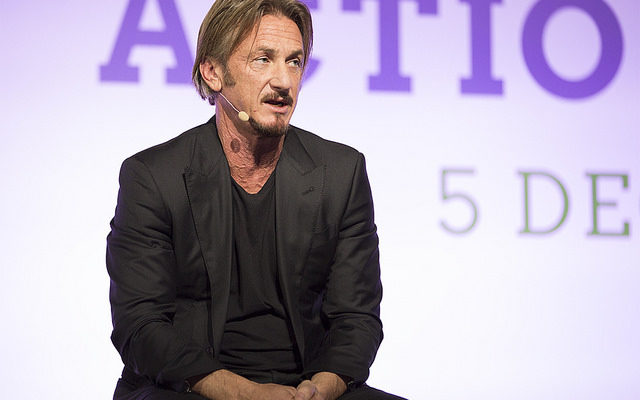
Sean Penn is Not an Author of Literary Merit
I am a woman and I study and teach literature. Until relatively recently in my life, this has seemed a pretty normal, womanly thing to do. Not only am I a teacher – a typically female profession – but I teach literature as opposed to science or math, and literature is definitely a female-dominated field.
All of this is true, until you think how amazing it is that women are interested in any kind of literature at all. Think about it: What authors did you read in your formative years? F. Scott Fitzgerald? J.D. Salinger? William Shakespeare? I could go on, but I’d guess you’re sensing a theme here. We spend a lot of time now looking for books that appeal to certain demographics to engage them in literature, but that wasn’t a thing when I was growing up, and I’m guessing it wasn’t for you, either, if you’re reading this. I’d say I was on the tail end of the dead white guy canon. I didn’t see myself in literature. But, somehow, I loved it anyway.
It really wasn’t until I got to college that my world was opened up. I was introduced to the writing of modern, female authors: Jorie Graham, Olena Kalytiak Davis. I was also introduced to writers of color, LGBTQ writers, male writers who do not espouse what we now call toxic masculinity.
And yet, there was still this pull to appreciate writers writing the same old toxic male bullshit. I will never forget the time that I was sitting and talking to one of my fellow (male) English major peers about Charles Bukowski. “Isn’t he brilliant?” he was saying, “The way he writes so eloquently about these bodily functions and builds to his poetic climax here. It’s just so gorgeous.” Um… no, I thought. Bodily functions are gross and I don’t see what is so brilliant about talking about shit in poetry. But I nodded and played along. I even tried to model some of my own poetry after Bukowski’s because it seemed like The Thing to Do. Needless to say, that phase didn’t last long – though I still have 3 of his books on my bookshelves.
The idea of crotchety old men thinking they have something brilliant to say is nothing new, which is why, when I saw that Sean Penn was promoting his new book, Bob Honey Who Just Do Stuff, (I kid you not, this is the title of his literary masterpiece.) on The Daily Show, I watched the opening two comedic segments and turned to something else for the interview. I’m not a fan of Sean Penn. His acting doesn’t move me, he is a known abuser of women, and I’ve never been one to subscribe to the idea that fame equals talent in multiple (or any) fields. Needless to say, I have not read his book but, luckily, I don’t need to. Not only do I already know it’s probably crap, but other, more talented reviewers have read it for me already. Claire Fallon wrote a brilliant review over at The Huffington Post, which is definitely worth a read all the way through. Here’s my favorite part:
As I read Bob Honey, I couldn’t stop thinking of Lili Loofbourow’s recent, brilliant Virginia Quarterly Review essay, “The Male Glance,” which argues that we refuse to read genius, or even artistic intentionality, into works by women. The flip side is that we do readily presume those things in the works of men. Her central example of the latter phenomenon was the first season of “True Detective,” which was “analyzed and investigated to the point of parody — so much so that, in the aftermath, multiple critics wrote articles about their experiences of so badly overreading the show’s ambitions.”
I sincerely believe that no serious critic will embrace Bob Honey as credulously and breathlessly as critics embraced “True Detective” ? the literary world is suspicious of hobbyist celebrity authors ? but Penn’s already been offered more benefit of the doubt than he’s earned, and more than any equivalent actress would receive. He joins a select crew of successful white male actors who think they have very literary things to say, and who have therefore been offered hardcover book deals with blurbs by Salman Rushdie.
She goes on to say that “Y’all: We don’t have to do this.” We don’t have to continue to give toxic men a platform just because they’ve won some awards and have a recognizable name. We don’t have to keep pretending that these toxic men have some kind of latent brilliance us laymen (laywomen?) can’t possibly begin to understand.
I agree. It is no secret that I love Catcher in the Rye, for example, but that love has changed distinctly from the wide-eyed love of a 15-year-old who has read her first coming of age novel with a stream of consciousness narrator to the love of an adult English literature teacher who thinks we have something to learn from Holden – and Salinger – and that something is not about phonies or teenage angst, but rather the way we treat young men who don’t fit the mold, and the way those young men tend to develop toxic relationships with women (as evidenced in the text). And, at least Salinger exhibited some talent in the area of writing, as opposed to some of what we are seeing published today where fame drives publication rather than the other way around.
Do we have anything to learn from Sean Penn? Maybe. Probably not. I doubt his oeuvre will stand the test of time. So I, for one, will not even be picking up Bob Honey from the library. Life is too short to read bad books.